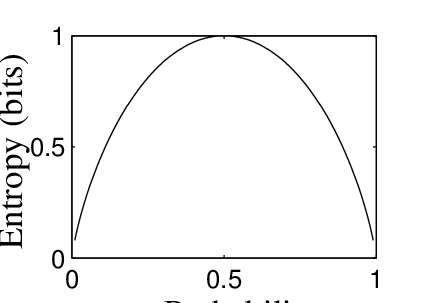I've found the explanation that:
The entropy of a binary random (Bernoulli) variable is a function of its probability and maximum when its probability is 0.5 (when it has an entropy of 1 bit). Intuitively, if a measurement is always false (or always true) then we are not uncertain of its value. If instead it is true as often as not, then the uncertainty, and hence the entropy, is maximised.
While I can see how this argument makes sense in the extreme case, I don't intuitively see why this is true. If a binary random variable is 1 with 80% probability and 0 with 20% probability, then when it is 1 will we will not be very surprised. However, when it is 0 we will be quite surprised, and it seems plausible that these two effects could offset each other in some way.
Can anyone provide more intuition for this?

